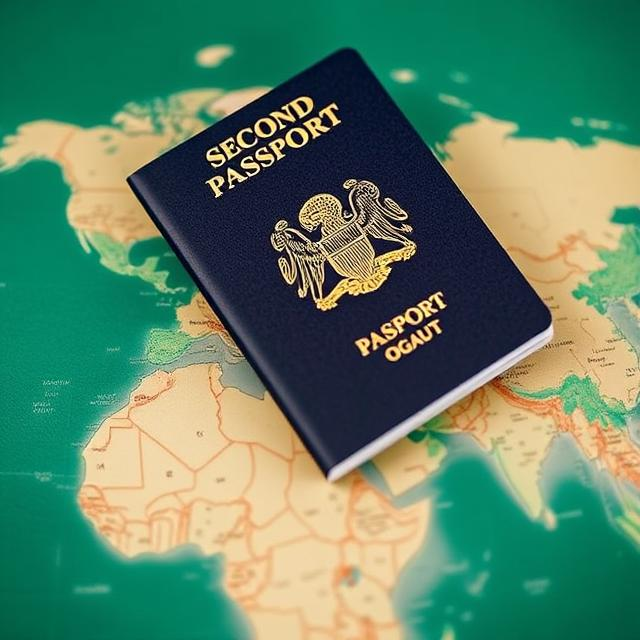A second passport can provide numerous advantages for Nigerian citizens, particularly in today’s increasingly globalized world. Whether for personal, professional, or travel-related reasons, having a second passport can help individuals navigate various challenges and unlock opportunities that may otherwise be out of reach. Here are some of the key benefits of acquiring a second passport for Nigerians: 1. Increased Travel Flexibility One of the primary benefits of having a second passport is the ability to travel more freely. Nigerians often face challenges when applying for visas, especially when their current passport has too many visas or is close to expiration. With a second passport, you can maintain one for active travel while using the other for visa applications, which can help avoid delays or complications when applying for visas. 2. Reduced Visa Delays If you travel frequently, you may encounter situations where your passport is held up for an extended period while awaiting a visa. A second passport allows you to continue traveling without interruption while your primary passport is being processed. This is particularly useful for business professionals or those who need to visit multiple countries in quick succession. 3. Protection of National Security For Nigerians who have concerns about safety or political instability in their home country or region, a second passport can provide a form of protection. In some cases, individuals may face persecution, or they may simply want to avoid undue scrutiny due to their nationality. Having a second passport issued by another country could serve as a safeguard in such situations. 4. Enhanced Business Opportunities A second passport can also open doors to international business ventures. Many countries have trade agreements, partnerships, and business opportunities that are more easily accessible to individuals with the ability to travel freely. A second passport may make it easier to network, attend business meetings, and explore opportunities in foreign markets without restrictions imposed by visa processing times. 5. Easier Access to Certain Countries Some countries impose strict visa requirements or travel restrictions for Nigerian passport holders, which can limit international movement. A second passport from a country that has less stringent travel requirements can facilitate easier access to certain countries, making it more convenient for business trips, vacations, or family visits. 6. Improved Privacy and Security A second passport can offer enhanced privacy and security for Nigerians engaged in sensitive work, such as diplomats, journalists, or human rights activists. These individuals may wish to avoid leaving traces of their travel history in certain regions. A second passport allows for more discretion and can be used to separate personal and professional travel records. 7. Visa-Free Access to More Countries Some countries offer visa-free or visa-on-arrival access to travelers from certain nations, but these benefits may not always extend to Nigerian passport holders. By obtaining a second passport from a country that enjoys more visa-free travel privileges, Nigerian passport holders can increase their access to countries that would otherwise require a visa. 8. Facilitation of Dual Citizenship Acquiring a second passport can also be an essential step toward securing dual citizenship. For Nigerians who are interested in relocating or settling in another country, obtaining a second passport can be part of the process of naturalization or citizenship by investment. Having dual citizenship can provide various benefits, including easier access to employment, healthcare, and education in another country. 9. Avoiding Travel Restrictions in Case of Dual Nationality Some countries may impose travel restrictions on individuals with dual nationality, particularly those who hold Nigerian and another country’s passport. In cases where there are tensions or political instability between Nigeria and another country, a second passport can help Nigerians avoid travel restrictions or limitations that may be imposed on their primary nationality. 10. Peace of Mind During Long-Term Travel For Nigerians who frequently engage in long-term travel or who live in multiple countries for extended periods, a second passport provides peace of mind. It can help you stay on top of visa renewals and ensure you’re not caught in any bureaucratic delays or problems while abroad. This flexibility is particularly beneficial for those working remotely or studying abroad.
Success Stories: Nigerians Who Won Prestigious International Scholarships
Winning an international scholarship is a dream for many students, and Nigerians are no exception. Over the years, many Nigerian students have secured prestigious scholarships, enabling them to pursue their academic goals abroad. These scholarships not only provide financial support but also open doors to global networks, diverse experiences, and world-class education. Here are a few success stories of Nigerians who won international scholarships: 1. Chinonso Okafor – The Chevening Scholarship Chinonso Okafor, a young Nigerian professional, was awarded the highly competitive Chevening Scholarship to pursue a Master’s degree in International Relations at the University of Sussex in the UK. The Chevening Scholarship, funded by the UK government, is known for selecting outstanding individuals with leadership potential. Chinonso’s Story: Chinonso, who worked as a project manager in Nigeria before applying for the scholarship, credits his success to his dedication to community development and his passion for international relations. His essay, which focused on his vision for leadership in Africa, resonated with the Chevening selection panel. He has since used his experience to contribute to initiatives aimed at fostering global partnerships in Africa. 2. Fatimah Abdullahi – The Fulbright Program Fatimah Abdullahi, an ambitious student from Kano, Nigeria, secured the prestigious Fulbright Scholarship to study for a Master’s in Public Health at Harvard University in the United States. The Fulbright Program, which offers funding for graduate studies, is one of the most recognized scholarship programs globally. Fatimah’s Journey: Fatimah’s journey to success was fueled by her strong academic background and dedication to improving healthcare in Nigeria. Before applying for the Fulbright, she worked in local health organizations, focusing on maternal and child health. Her application was strengthened by her passion for public health and her desire to return to Nigeria to implement better health policies. Today, Fatimah is a public health advocate who works on global health issues. 3. Tolu Oke – The Rhodes Scholarship Tolu Oke, a brilliant Nigerian student from Lagos, was awarded the Rhodes Scholarship to study at the University of Oxford in the UK. The Rhodes Scholarship is one of the oldest and most prestigious international scholarships, with recipients coming from various fields, including politics, business, science, and the arts. Tolu’s Achievement: Tolu, who studied Political Science at the University of Lagos, was deeply involved in student leadership and social justice initiatives. He was recognized for his exceptional academic performance and his drive to create systemic change. His work in political activism and his passion for democratic governance made him a perfect fit for the Rhodes community. Tolu’s experience at Oxford has empowered him to continue working on global political reform. 4. Amina Ibrahim – The DAAD Scholarship Amina Ibrahim from Abuja secured the DAAD Scholarship to pursue a Master’s in Development Studies at the University of Leipzig in Germany. The DAAD (German Academic Exchange Service) offers scholarships to international students from developing countries to study in Germany. Amina’s Path: Amina’s passion for development work and sustainable projects in Africa led her to apply for the DAAD Scholarship. She had worked on several local development projects in Nigeria before her application, and her dedication to improving education and infrastructure in underserved communities caught the attention of the DAAD panel. Amina is now working on development projects in rural Nigeria, focusing on education, healthcare, and economic empowerment. 5. Uche Chika – The Erasmus Mundus Scholarship Uche Chika, a Nigerian graduate from the University of Nigeria, Nsukka, was awarded the Erasmus Mundus Scholarship for a joint Master’s program in Environmental Sciences, Policy, and Management. Erasmus Mundus is an initiative funded by the European Union, offering scholarships for students to study in multiple European universities. Uche’s Impact: Uche’s interest in environmental conservation and climate change led him to apply for the Erasmus Mundus Scholarship. His background in environmental studies, combined with his hands-on experience working with NGOs in Nigeria, made him a standout applicant. Uche now works with international organizations to promote sustainable environmental practices in Africa, advocating for policies that tackle climate change on the continent. 6. Ngozi Okafor – The United Nations Scholarship Ngozi Okafor, a dedicated Nigerian student, was awarded the United Nations (UN) Scholarship to pursue a Master’s degree in Sustainable Development. The UN offers scholarships to students from developing countries who demonstrate a commitment to global peace and development. Ngozi’s Story: Ngozi, who has always been passionate about international development, used her background in international relations and community service to apply for the scholarship. Her dedication to empowering women in rural communities and advocating for gender equality stood out. Ngozi now works with the UN in its initiatives for gender equality and women’s empowerment, particularly in Sub-Saharan Africa. 7. Emmanuel Olayemi – The MEXT Scholarship Emmanuel Olayemi, a graduate of Electrical Engineering from the University of Lagos, was awarded the MEXT Scholarship (Monbukagakusho) by the Japanese government. The MEXT Scholarship provides financial support to international students wishing to pursue undergraduate or graduate studies in Japan. Emmanuel’s Progress: Emmanuel’s interest in technology and innovation, combined with his engineering background, led him to pursue the MEXT Scholarship. He was drawn to Japan for its leading-edge technology and research opportunities. Since completing his Master’s degree in Japan, Emmanuel has worked in the tech industry, contributing to projects that bridge the technology gap between Africa and Asia.
How To Apply For Scholarships In Asian Universities
Applying for scholarships in Asian universities can be a rewarding way to pursue higher education. Many Asian countries offer scholarships for international students, covering tuition fees, living expenses, and more. Here’s a step-by-step guide on how to apply for scholarships in Asian universities: 1. Research Available Scholarships Start by identifying the scholarships offered by universities in your preferred Asian countries. Some popular destinations for international students include China, Japan, South Korea, Singapore, and India. Scholarships can be offered by universities, governments, or external organizations. Steps: 2. Review Eligibility Criteria Each scholarship has specific eligibility requirements, so ensure that you meet all criteria before applying. Common requirements include academic performance, language proficiency (such as English or the country’s native language), and specific fields of study. Things to Check: 3. Prepare Required Documents Most scholarships will require you to submit specific documents as part of your application. Be sure to gather everything well in advance to avoid last-minute issues. Common Documents Include: 4. Follow the Application Guidelines Carefully read and follow the application guidelines provided by the scholarship program. Ensure that you are submitting all the required documents in the correct format and that your application is complete. Pay attention to any specific instructions regarding language preferences (English or local language) for your documents. Key Tips: 5. Submit Your Application After completing all the necessary documents and filling out the application form, submit your application before the deadline. Most scholarships today allow you to apply online, but some may require physical submissions. Important Steps: 6. Prepare for Interviews or Tests Some scholarships, especially highly competitive ones, may involve an interview or a written test. If shortlisted, you may be invited to participate in an online or in-person interview. How to Prepare: 7. Wait for Results After submitting your application, there will typically be a waiting period before you are notified of the results. Be patient, and keep checking the university’s website or your email for any updates. Things to Do During Waiting Period: 8. Accept the Scholarship Offer If you receive an offer for the scholarship, review the terms and conditions carefully before accepting. You may need to sign a scholarship agreement or provide additional documentation, such as proof of enrollment in the university. Next Steps After Acceptance: 9. Prepare for Studying Abroad Once your scholarship is secured, you can start preparing for your studies in Asia. This may involve applying for a student visa, securing accommodation, and making travel arrangements. Things to Consider:
Navigating Scholarship Interviews: Common Questions And Answers
Scholarship interviews are an important part of the application process, as they provide an opportunity for you to showcase your personality, achievements, and potential. It’s essential to prepare effectively to make a lasting impression. Below are some common scholarship interview questions and tips for answering them: 1. Tell Us About Yourself Purpose: This is often the first question in an interview. It’s your chance to introduce yourself in a way that highlights your strengths and personality. How to Answer: Focus on a brief personal introduction that includes your background, academic achievements, extracurricular involvement, and career goals. Keep it relevant to the scholarship and avoid talking too much about unrelated personal details. Example:“I’m a dedicated student from [City/Country], currently studying [Major]. I have a passion for [Field/Interest], and I’m actively involved in [Extracurricular Activity]. I’m applying for this scholarship because I believe it will help me achieve my goal of [Career Goal].” 2. Why Do You Deserve This Scholarship? Purpose: This question gives you a chance to explain why you stand out from other candidates and how the scholarship aligns with your goals. How to Answer: Highlight your academic achievements, extracurricular involvement, and long-term goals. Mention how receiving the scholarship will help you overcome any financial challenges and enable you to achieve your full potential. Example:“I’ve consistently demonstrated academic excellence and commitment to my community through [Examples]. This scholarship will allow me to focus on my studies without financial concerns, helping me achieve my dream of becoming [Career Goal] and making an impact in [Field].” 3. What Are Your Short-Term and Long-Term Goals? Purpose: Scholarship committees want to understand your motivation and how you plan to use the opportunity. How to Answer: Discuss both your short-term and long-term goals, ensuring that your plans are realistic and related to your field of study. Show how the scholarship fits into these goals. Example:“In the short term, I aim to complete my degree with distinction and gain practical experience through internships in [Industry]. In the long term, I plan to work in [Field] and contribute to [Impact you hope to make]. This scholarship will help me reach these goals by providing the financial support I need to focus on my studies.” 4. How Do You Plan to Contribute to Our Community/Organization? Purpose: This question assesses whether you will be an active, engaged recipient of the scholarship who will give back in some way. How to Answer: Demonstrate your commitment to community engagement and explain how you will contribute to the organization or broader community in the future. Example:“I believe in the importance of giving back. After completing my studies, I plan to volunteer with [Organization/Community Initiative] to support students who are pursuing higher education. I also want to share the knowledge and skills I gain with underprivileged communities to create opportunities for others.” 5. Why Did You Choose Your Field of Study? Purpose: This question gauges your passion for your chosen field and whether you’ve carefully considered your career path. How to Answer: Share a personal story or experience that led you to choose your major or field of interest. Connect your passion with your future career aspirations. Example:“I chose [Field of Study] because I’ve always been fascinated by [Aspect of the Field]. My interest deepened when I [Personal Experience]. I’m excited to pursue this field because I believe it will allow me to make a difference in [Industry or Society].” 6. What Challenges Have You Overcome to Get Here? Purpose: Scholarship committees want to know if you’ve faced adversity and how you’ve dealt with it, as this shows resilience and determination. How to Answer: Share a specific challenge you’ve faced, how you overcame it, and the lessons you learned. Avoid overly personal or sensitive issues that may not be relevant. Example:“One of the challenges I’ve faced was balancing my academics with my responsibilities as a caregiver. Despite the difficulties, I learned time management skills, how to stay focused under pressure, and how to ask for help when needed. These experiences have made me more resilient and motivated to succeed.” 7. How Will This Scholarship Help You Achieve Your Career Goals? Purpose: Scholarship committees want to see how the award will directly impact your education and career trajectory. How to Answer: Be clear about how receiving the scholarship will make a difference in your education and career. Explain how it will alleviate financial stress or allow you to pursue opportunities that may otherwise be unavailable. Example:“This scholarship will allow me to focus more on my studies without the burden of financial stress. It will also provide me with the opportunity to pursue internships and networking events that are crucial to my future career in [Industry].” 8. What Are Your Strengths and Weaknesses? Purpose: This question tests your self-awareness and honesty. How to Answer: Be honest about your strengths and weaknesses, but make sure to frame your weaknesses as areas you’re actively working to improve. For strengths, focus on qualities that are relevant to the scholarship. Example:“My strength is my ability to stay organized and manage multiple projects at once, which helps me excel academically. My weakness is that I sometimes take on too many responsibilities at once, but I’m learning to prioritize and delegate tasks when necessary.” 9. Why Should We Choose You Over Other Candidates? Purpose: This question is your chance to sell yourself and highlight what makes you unique. How to Answer: Focus on your unique strengths, experiences, and qualities that make you the ideal candidate. Highlight any exceptional achievements or contributions that set you apart. Example:“I believe I am a strong candidate for this scholarship because of my dedication to both academics and community service. I have maintained a high GPA while also leading volunteer projects and helping organize events in my community. My commitment to making a difference, combined with my passion for [Field], will allow me to make the most of this scholarship.” 10. How Do You Plan to Give Back After Receiving the Scholarship? Purpose: This question
The Importance Of Extracurricular Activities In Scholarship Applications
Extracurricular activities play a crucial role in scholarship applications, as they offer a holistic view of a student’s character, skills, and potential. While academic achievements are undoubtedly important, extracurricular involvement can set you apart from other applicants and demonstrate your commitment, leadership, and well-roundedness. Here’s why extracurricular activities matter in scholarship applications: 1. Showcase Your Leadership Abilities Being involved in extracurricular activities—such as serving as a club president, organizing events, or leading a sports team—demonstrates your ability to take initiative and guide others. Leadership is a highly valued trait in scholarship applicants because it shows that you can handle responsibility and have the potential to make a positive impact in your future endeavors. 2. Demonstrate Commitment and Time Management Engaging in extracurricular activities requires time and effort outside of your academic responsibilities. Balancing schoolwork with other activities like sports, volunteering, or part-time jobs shows that you can manage your time effectively, a skill that is essential for academic success and future career prospects. 3. Reflect Personal Interests and Passion Extracurricular activities provide insight into your personal interests, passions, and values. Scholarships often aim to support individuals who are not only academically strong but also passionate about their pursuits. Whether it’s music, sports, community service, or entrepreneurship, these activities reflect your dedication to something beyond academics. 4. Highlight Collaboration and Teamwork Many extracurricular activities, such as group projects, sports teams, or volunteer work, involve collaboration with others. This demonstrates your ability to work in a team, communicate effectively, and contribute to collective goals—qualities that are highly sought after by scholarship committees. 5. Enhance Your Application with Unique Experiences Extracurricular activities can make your scholarship application stand out, especially if you’ve participated in unique or impactful experiences. Volunteering abroad, participating in research projects, or starting a social initiative can make your application memorable and show that you have a diverse range of experiences. 6. Demonstrate a Strong Work Ethic Active participation in extracurricular activities, particularly those that require dedication and persistence, showcases your strong work ethic. Whether it’s practicing for a sport, rehearsing for a play, or working at a community organization, your involvement indicates that you’re willing to put in the effort to achieve your goals. 7. Provide Opportunities for Letters of Recommendation Extracurricular activities often provide opportunities for you to build relationships with mentors, coaches, or community leaders who can write strong letters of recommendation for you. These letters can provide a more personal and detailed view of your strengths, character, and accomplishments outside the classroom. 8. Strengthen Your Personal Narrative Scholarship committees often want to understand the person behind the grades. Your extracurricular involvement can help you tell a compelling personal story that shows who you are, what you care about, and why you’re a good fit for the scholarship. It adds depth and context to your academic achievements. 9. Show Your Ability to Make an Impact Many scholarships are awarded to students who have shown a potential to make a significant impact in their field or community. Extracurricular activities that involve community service, social advocacy, or volunteer work demonstrate your desire to create positive change, which is a quality that many scholarship providers look for. 10. Stand Out in Competitive Scholarship Applications In a pool of highly competitive applicants, extracurricular activities can be the factor that makes you stand out. Scholarship committees often look for applicants who are well-rounded and have demonstrated that they are capable of excelling in areas beyond academics.
How To Find Scholarships For Online Degree Programs
Pursuing an online degree can offer flexibility and convenience, but it also comes with financial challenges. Fortunately, there are numerous scholarships available to help ease the cost of your education. Here’s a step-by-step guide to finding scholarships for online degree programs: 1. Research University-Specific Scholarships Many universities that offer online degree programs provide scholarships specifically for online students. These scholarships may be merit-based, need-based, or even specific to certain degree programs. 2. Explore Government Scholarships and Grants Governments, both locally and internationally, offer various scholarships and grants for students pursuing higher education online. These scholarships may be geared toward certain fields of study, geographical locations, or specific student groups. 3. Use Scholarship Search Engines There are several scholarship search engines that compile scholarship opportunities for various types of students, including those pursuing online degrees. These platforms allow you to filter results based on your needs, degree level, field of study, and more. 4. Check Professional Organizations in Your Field Many professional organizations and associations offer scholarships to students pursuing careers in specific fields of study. These scholarships may be available for both traditional and online degree programs. 5. Look for Employer-Sponsored Scholarships Some employers offer scholarships or tuition assistance for employees who wish to pursue higher education, including online programs. If you’re currently employed, inquire about any educational benefits that may be available to you. 6. Explore Private and Nonprofit Scholarships Numerous private foundations and nonprofit organizations offer scholarships to students, including those pursuing online degrees. These scholarships can be based on a variety of factors, such as academic achievement, financial need, or community involvement. 7. Investigate Military and Veteran Scholarships If you or a family member is a veteran or active military member, there are a variety of scholarships and financial aid programs specifically designed for military students. These can be used for both traditional and online degree programs. 8. Explore Scholarships for Specific Demographics Some scholarships are targeted at specific demographic groups, such as women, minorities, international students, or nontraditional students. Many of these scholarships can be used for online programs. 9. Check for Scholarships for Part-Time Students Many online students pursue their degrees part-time while working or caring for family members. Some scholarships are specifically for part-time students, so don’t overlook this option if you’re studying part-time. 10. Look for Crowdfunding and Alternative Funding If you’re struggling to find traditional scholarships, consider using crowdfunding platforms like GoFundMe or Indiegogo to raise money for your online education. Many students have used crowdfunding to fund their degrees. 11. Apply for Multiple Scholarships Don’t limit yourself to just one scholarship application. Apply to as many scholarships as possible to increase your chances of receiving funding. 12. Review Online Scholarship Databases Several online scholarship databases list funding opportunities specifically for online degree programs. These can help you locate relevant scholarships based on your field of study or degree level.
Tips For Securing Scholarships To Study In The USA
Securing a scholarship to study in the USA can be a competitive and complex process, but with proper preparation and strategy, you can increase your chances of success. Here are some essential tips for Nigerian students aiming to secure scholarships for U.S. universities: 1. Start Early Scholarship applications often require significant preparation, including essays, recommendation letters, and standardized test scores. Start your research and application process at least a year before the intended start date to ensure you meet all deadlines. 2. Research Multiple Scholarship Sources There are various scholarship opportunities available for international students, ranging from university-specific scholarships to government-funded programs and private organizations. Some of the most popular scholarships include: 3. Maintain a Strong Academic Record Most scholarships, especially merit-based ones, require strong academic performance. U.S. universities are highly competitive, so a high GPA, good SAT/ACT scores (for undergraduate applicants), or GRE/GMAT scores (for graduate applicants) will significantly improve your chances. 4. Write a Compelling Personal Statement Your personal statement or essay is often a critical component of your scholarship application. It allows you to showcase your personality, achievements, and future aspirations. 5. Secure Strong Letters of Recommendation Many scholarships require one or more letters of recommendation from teachers, professors, or employers. Choose recommenders who know you well and can speak to your academic abilities, character, and potential. 6. Focus on Extracurricular Activities and Leadership U.S. universities value well-rounded students, so extracurricular activities such as volunteer work, internships, leadership roles, or involvement in student organizations can significantly enhance your application. 7. Proof of Financial Need (If Applicable) If applying for need-based scholarships, you may need to provide proof of your financial need. Documents such as family income statements, bank statements, or affidavits may be required. 8. Prepare for Standardized Tests Many U.S. scholarships require standardized test scores, such as the SAT/ACT for undergraduates or the GRE/GMAT for graduate students. These scores are crucial for scholarships, particularly merit-based ones. 9. Apply for Multiple Scholarships Don’t limit yourself to just one scholarship. Applying to multiple scholarships increases your chances of success. Many scholarships are designed for students from specific countries or fields of study, so you have many opportunities to explore. 10. Consider Regional or Subject-Specific Scholarships Some scholarships are tailored to specific regions, fields of study, or demographics. For example, there are scholarships specifically for students from Africa or Nigeria, or for students pursuing fields like STEM, business, or the arts. 11. Be Aware of Scams Scholarship scams are unfortunately common. Be cautious of scholarships that require an application fee or promise guaranteed funding in exchange for money. 12. Keep Your Documents Organized Make sure all the documents you need for your applications, such as transcripts, standardized test scores, recommendation letters, and financial documents, are organized and ready to submit when required. 13. Apply for State and Federal Financial Aid (for U.S. Residents) If you are already a U.S. resident or have legal status in the country, you may qualify for state or federal financial aid programs such as Pell Grants or Federal Work-Study.
Scholarships In Europe: Opportunities For Nigerian Graduates
Europe is home to some of the world’s most prestigious universities and institutions, offering excellent opportunities for Nigerian graduates to further their education. Many European countries provide scholarships specifically for international students, including Nigerians, to pursue postgraduate and doctoral programs. Here’s a guide to scholarships in Europe that Nigerian graduates can apply for: 1. Erasmus Mundus Joint Master Degrees (EMJMDs) The Erasmus Mundus program is one of the most prestigious scholarship programs offered by the European Union (EU). It is aimed at international students, including Nigerian graduates, who wish to study a joint master’s degree at universities across Europe. Tip: Research the specific Erasmus Mundus programs available for the academic year you intend to apply. The application process often involves multiple institutions. 2. DAAD Scholarships (Germany) Germany is known for its world-class education system and offers various scholarships for international students through the German Academic Exchange Service (DAAD). The DAAD scholarships provide opportunities for Nigerian graduates to pursue postgraduate studies in Germany. Tip: DAAD has specific deadlines, so check the website for the scholarship programs and application guidelines. 3. The Holland Scholarship (Netherlands) The Holland Scholarship is for international students from outside the European Economic Area (EEA), including Nigerian graduates, who wish to study in the Netherlands. This scholarship is provided by the Dutch Ministry of Education and several Dutch research universities. Tip: Check the specific universities offering this scholarship and confirm eligibility based on your chosen field of study. 4. Chevening Scholarships (United Kingdom) Chevening Scholarships are the UK government’s global scholarship program aimed at developing future leaders. Nigerian graduates who have the potential to contribute to the development of their home country can apply for these highly competitive scholarships. Tip: Applications for Chevening Scholarships usually open in August and close in November. Make sure to research the eligibility requirements and start preparing early. 5. Swedish Institute Scholarships for Global Professionals (Sweden) The Swedish Institute offers scholarships for Nigerian graduates wishing to study at Swedish universities. These scholarships are aimed at students who have demonstrated leadership potential and are committed to contributing to the development of their home country. Tip: Applications for Swedish Institute scholarships open once a year, so make sure to apply early. The application process is competitive, so ensure your personal statement highlights your leadership potential. 6. The Eiffel Excellence Scholarship Program (France) The Eiffel Scholarship is a French government initiative designed to attract international talent for postgraduate and doctoral programs in French institutions. Nigerian graduates can apply for this prestigious scholarship to study in France. Tip: The Eiffel Scholarship is highly competitive, so it’s essential to ensure your application stands out, particularly your academic achievements and motivation for studying in France. 7. Italian Government Scholarships (Italy) The Italian Government offers scholarships for international students, including Nigerian graduates, to pursue undergraduate, postgraduate, and research programs at Italian universities. Tip: Each Italian university may have specific application processes and deadlines, so be sure to check the respective university websites for more details. 8. University-Specific Scholarships Many European universities offer their own scholarships for international students, including Nigerian graduates. These scholarships often cover tuition fees, living expenses, or both. Tip: Visit the scholarship pages of the universities you’re interested in and apply for their specific funding opportunities. 9. The Swiss Government Excellence Scholarships (Switzerland) Switzerland offers scholarships for postgraduate and research studies to international students through the Swiss Government Excellence Scholarships. These scholarships are aimed at talented individuals who wish to study in Switzerland. Tip: Research the specific programs and eligibility criteria for the Swiss Government Excellence Scholarships on their official website.
Understanding The Application Process For International Scholarships
Applying for international scholarships can be a competitive yet rewarding endeavor. With proper preparation and understanding of the application process, you can increase your chances of securing funding for your education abroad. Here’s a comprehensive guide to help you navigate through the process: 1. Research Available Scholarships The first step in the application process is identifying scholarships that align with your academic goals, career interests, and eligibility. There are various types of international scholarships, including: Tip: Utilize online scholarship search engines, university websites, and government portals to find relevant opportunities. 2. Check Eligibility Criteria Each scholarship has its own set of eligibility requirements. Carefully review these criteria to ensure that you qualify before investing time and effort into the application. Common eligibility factors include: Tip: Make a checklist of eligibility requirements and cross-check them with your qualifications. 3. Prepare Necessary Documents Once you’ve identified a scholarship and confirmed your eligibility, it’s time to gather the necessary documents for your application. Common documents include: Tip: Double-check the required documents for each scholarship to ensure you’re not missing anything. 4. Write a Compelling Personal Statement or Essay Many international scholarships require a personal statement or essay as part of the application. This is your chance to showcase your personality, academic achievements, and aspirations. When writing your essay, be sure to: Tip: Tailor your personal statement to each scholarship, reflecting its values and mission. 5. Submit Your Application Once you’ve gathered all the required documents and written a compelling personal statement, it’s time to submit your application. Pay attention to: Tip: Keep a copy of your application and all supporting documents for your records. 6. Prepare for Interviews (If Applicable) Some scholarships may require an interview as part of the selection process. Prepare by: Tip: Be confident, professional, and articulate during the interview. Show your passion for the program and how it aligns with your goals. 7. Wait for the Outcome After submitting your application, the scholarship committee will review all applications and select recipients. Be patient as this process can take time. You may receive: Tip: If you don’t receive the scholarship, don’t be discouraged. There are many other opportunities out there, and you can always apply for additional scholarships in the future. 8. Accept the Scholarship Offer If you are awarded a scholarship, you’ll need to formally accept the offer and fulfill any requirements outlined by the scholarship provider, such as: Tip: Read the terms and conditions of the scholarship carefully to ensure you meet all obligations. 9. Plan for Your Study Abroad Journey Once you’ve secured the scholarship, it’s time to plan your journey abroad. This includes: Tip: Stay in touch with your scholarship provider, as they may have additional resources or support for students moving abroad.
How To Write A Winning Scholarship Essay
Writing a scholarship essay can be a challenging yet rewarding task. A well-written essay not only helps you stand out but can also significantly increase your chances of securing funding for your education. Here’s a step-by-step guide to writing a compelling scholarship essay: 1. Understand the Prompt Before you begin, take the time to carefully read the essay prompt. Understand what the scholarship committee is asking for and ensure that you address each part of the question. Be sure to highlight key themes such as your goals, achievements, personal story, and how you align with the values of the scholarship provider. 2. Start with a Strong Introduction Your introduction should grab the reader’s attention right from the start. Use a hook—such as an interesting fact, personal story, or a thought-provoking statement—to engage the reader. This is your chance to make a lasting impression and set the tone for the rest of your essay. 3. Highlight Your Achievements and Goals Scholarship committees are looking for applicants who demonstrate potential for success. In the body of your essay, discuss your academic, personal, and extracurricular achievements. Explain why these accomplishments are meaningful to you and how they have prepared you for the next step in your education or career. 4. Share Your Personal Story One of the most powerful elements of a scholarship essay is a personal story. Share a specific experience or challenge you have overcome. Whether it’s about your academic journey, personal development, or involvement in a particular cause, make it relatable and authentic. 5. Demonstrate Your Passion Show the scholarship committee your enthusiasm and dedication to your goals. Whether you’re passionate about your field of study or a specific cause, make sure your passion shines through in your writing. Passionate essays are more likely to leave a lasting impression. 6. Tailor the Essay to the Scholarship Each scholarship essay should be customized to the specific scholarship you are applying for. Avoid using generic or recycled content. Focus on how you fit the specific criteria for that scholarship, whether it’s related to your field of study, career goals, or personal values. 7. Keep It Focused and Concise Stay on topic and ensure that your essay is well-structured. Avoid going off on tangents. Stay focused on the main points and ensure that every paragraph serves a purpose in answering the essay prompt. 8. Show, Don’t Just Tell Instead of simply stating that you’re hardworking, passionate, or committed, provide concrete examples to support these claims. Share specific instances where you demonstrated these qualities, and explain how they impacted your life or others. 9. Proofread and Edit Once you’ve written your essay, take the time to review and revise it. Look for grammatical errors, spelling mistakes, and awkward phrasing. It can be helpful to have someone else read your essay to catch mistakes you might have missed. 10. End with a Strong Conclusion Your conclusion should summarize your main points and reinforce why you deserve the scholarship. Leave the reader with a strong impression by reiterating how the scholarship will help you achieve your goals and contribute to your community or field of study. Additional Tips:











